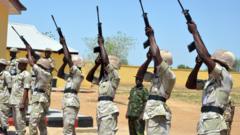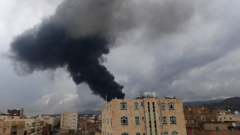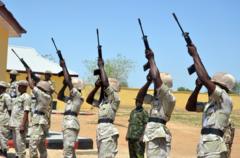Iranian authorities have escalated efforts against suspected Israeli collaborators following a recent spike in violence and targeted killings attributed to foreign espionage.
**Wave of Arrests and Executions in Iran Amidst Israel Conflict Unfolds**

**Wave of Arrests and Executions in Iran Amidst Israel Conflict Unfolds**
In the aftermath of ongoing tensions with Israel, Iran intensifies its crackdown on dissent through arrests and executions.
Authorities in Iran have launched a widespread crackdown on its populace, resulting in numerous arrests and multiple executions of individuals believed to be connected to Israeli intelligence agencies amidst the backdrop of the recent conflict. Officials claim that a significant infiltration of Iranian security by Israeli operatives has compromised national security, leading to high-profile assassinations of key military and nuclear figures, predominantly linked to Israel's Mossad.
The Iranian government has labeled those suspected of collaboration as threats to national security, increasing concerns regarding the fair treatment of detainees and the potential for abuses such as forced confessions and unfair trials. Over a week of hostilities, three individuals were executed for espionage linked to Israel, with additional executions announced soon after a ceasefire agreement.
The scale of the crackdown has since expanded, with state media reporting hundreds of arrests and publicizing alleged confessions from detainees. Human rights advocates have criticized the regime's harsh measures, fearing a resurgence of past abuses reminiscent of the 1980s when state-led violence against dissidents peaked.
Alongside the arrests, the Iranian government has amplified efforts to stifle dissent among journalists, especially those reporting for Persian-language outlets abroad, by targeting their family members as a form of intimidation. Reports of threats and coercion towards journalists working with BBC Persian and others have surfaced, as authorities utilize harsh tactics to silence criticism.
Activists, artists, and family members of previously highlighted dissenters have also been caught in the government's sweeping net, indicating a broader strategy of repression that extends into various facets of Iranian society. Amidst internet access restrictions that have become routine during crises, the environment of fear has intensified in the wake of the conflict with Israel, potentially foreshadowing further unease in the region as the nation grapples with its internal strife.
With echoes of the brutal crackdown from previous decades still resonating, both domestic and international observers express alarm at the potential for Iran's leadership to increasingly resort to violence and repression, as fears grow of them attempting to consolidate power in the wake of international criticism and conflict.
The Iranian government has labeled those suspected of collaboration as threats to national security, increasing concerns regarding the fair treatment of detainees and the potential for abuses such as forced confessions and unfair trials. Over a week of hostilities, three individuals were executed for espionage linked to Israel, with additional executions announced soon after a ceasefire agreement.
The scale of the crackdown has since expanded, with state media reporting hundreds of arrests and publicizing alleged confessions from detainees. Human rights advocates have criticized the regime's harsh measures, fearing a resurgence of past abuses reminiscent of the 1980s when state-led violence against dissidents peaked.
Alongside the arrests, the Iranian government has amplified efforts to stifle dissent among journalists, especially those reporting for Persian-language outlets abroad, by targeting their family members as a form of intimidation. Reports of threats and coercion towards journalists working with BBC Persian and others have surfaced, as authorities utilize harsh tactics to silence criticism.
Activists, artists, and family members of previously highlighted dissenters have also been caught in the government's sweeping net, indicating a broader strategy of repression that extends into various facets of Iranian society. Amidst internet access restrictions that have become routine during crises, the environment of fear has intensified in the wake of the conflict with Israel, potentially foreshadowing further unease in the region as the nation grapples with its internal strife.
With echoes of the brutal crackdown from previous decades still resonating, both domestic and international observers express alarm at the potential for Iran's leadership to increasingly resort to violence and repression, as fears grow of them attempting to consolidate power in the wake of international criticism and conflict.


















